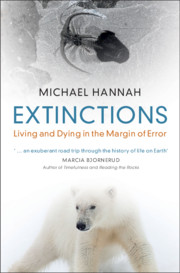Book contents
- Extinctions
- Reviews
- Extinctions
- Copyright page
- Epigraph
- Dedication
- Contents
- Preface
- Acknowledgements
- Further Reading
- Introduction
- 1 The Anthropocene and the Earth System
- 2 A Short Detour: The Fossil Record and the Geological Time Scale
- 3 The Origin of Animals and the Emergence of the Earth System
- 4 Documenting Ancient Biodiversity
- 5 Mass Extinctions: The Basics
- 6 Causes of the End-Permian and End-Cretaceous Extinction Events
- 7 Time Heals All: Recovering from a Mass Extinction
- 8 The Late Quaternary Megafaunal Extinctions
- 9 Surviving the Anthropocene
- Book part
- Further Reading
- Index
8 - The Late Quaternary Megafaunal Extinctions
Published online by Cambridge University Press: 01 September 2021
- Extinctions
- Reviews
- Extinctions
- Copyright page
- Epigraph
- Dedication
- Contents
- Preface
- Acknowledgements
- Further Reading
- Introduction
- 1 The Anthropocene and the Earth System
- 2 A Short Detour: The Fossil Record and the Geological Time Scale
- 3 The Origin of Animals and the Emergence of the Earth System
- 4 Documenting Ancient Biodiversity
- 5 Mass Extinctions: The Basics
- 6 Causes of the End-Permian and End-Cretaceous Extinction Events
- 7 Time Heals All: Recovering from a Mass Extinction
- 8 The Late Quaternary Megafaunal Extinctions
- 9 Surviving the Anthropocene
- Book part
- Further Reading
- Index
Summary
Between 50 thousand and 10 thousand years ago many of the large vertebrate animals, the megafauna, went extinct on all continents except Africa. There the elephant, big cats, hippo and others are remnants of a megafauna that once occupied the entire globe. This is the youngest mass extinction in the fossil record and there have been several suggestions for what caused it: climatic instability as the planet emerged from the last ice age; the appearance of the first modern human hunters; and climatic instability driven by the impact of a comet. There is considerable scepticism about the impact scenario, so most workers fall into one of two camps – either climate change or humans were wholly responsible for the extinction. However, there is a growing body of opinion that supports the idea that neither climate nor the presence of humans on their own were enough to trigger the megafaunal extinctions: some combination of the two is needed.
Keywords
Information
- Type
- Chapter
- Information
- ExtinctionsLiving and Dying in the Margin of Error, pp. 169 - 192Publisher: Cambridge University PressPrint publication year: 2021
